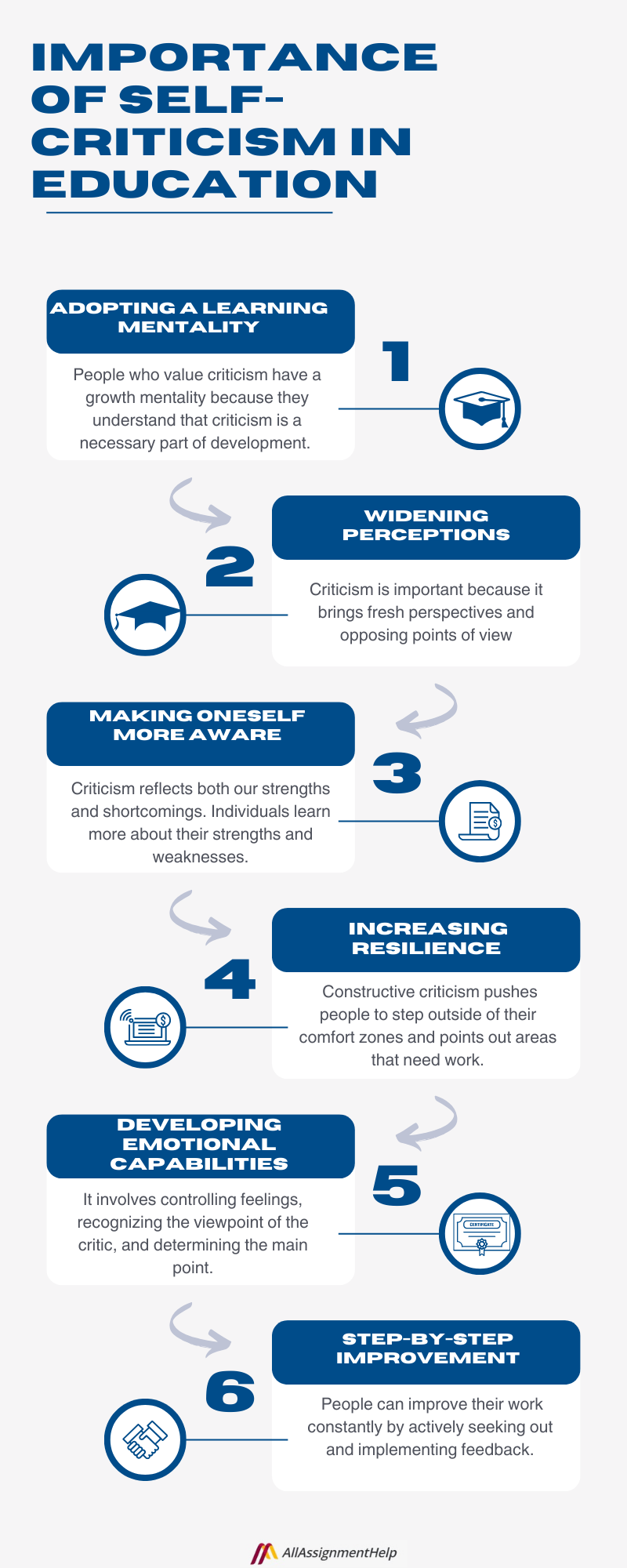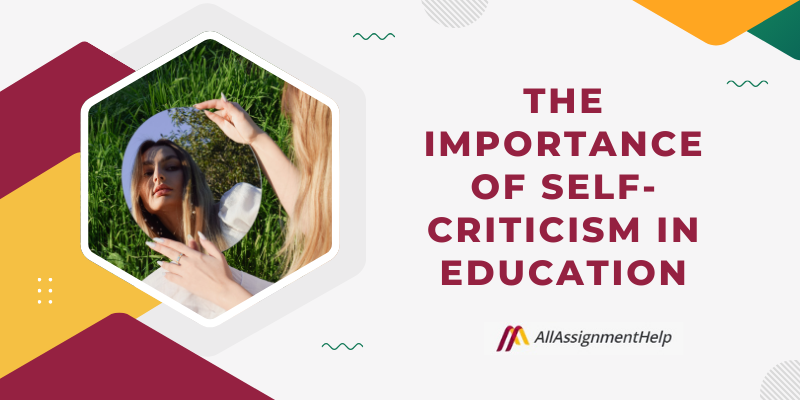Table of Contents
Have you ever noticed that you are constantly talking to yourself and calling yourself derogatory names? This is called self-criticism. It means thinking about yourself harshly or negatively.
This negative voice can appear in different ways, like focusing on your flaws, holding on to past mistakes, or speaking badly about yourself in your mind.
Even though it is sometimes seen as unfavourable criticism, it has the amazing capacity to encourage strength and personal development. A lot of successful people welcome criticism as a useful instrument for personal development. Self-criticism could be used as a performance tool that has the potential to bring positive results. It is even valid for students in academics as it may help them to introspect the performance barrier and overcome the hurdles causing failure.
This blog by AllAssignmentHelp examines its uplifting perspective, which sees criticism as a chance to grow, acquire new skills, and become stronger than before.
Read Also: Different Career Opportunities With a Bachelor of Arts Degree
Meaning of Self-Criticism
Self-criticism means learning from others’ expectations and using them to judge your actions, ideas, or achievements. It involves finding mistakes or weaknesses based on these standards.
Sometimes excessive or constant self-criticism can have negative impacts on mental health and well-being. It results in feelings of poor self-esteem, anxiety, and depression. Although some self-criticism is healthy and can inspire people to develop and evolve.
To handle self-criticism well, you need to be kind to yourself. Learn to see your mistakes but don’t be too hard on yourself.
What is Self-Criticism in Academics?
Self-criticism in education refers to the capacity of students and teachers to assess their work, identify weaknesses, and make improvements for better learning and academic growth. It is an important aspect of personal and intellectual growth, helping individuals refine their skills, overcome challenges, and strive for excellence in education.
However, constructive self-criticism allows students to recognize areas where they need improvement, whether in study habits, time management, or exam preparation. In situations where students feel overburdened, seeking support can be a smart choice. For example, if you are struggling with exam preparation or managing multiple exams, you can ask a professional, Can you take my online exam? These online class experts ensure that your academic progress remains on track while reducing stress and allowing you to focus on overall learning and development.
Key Aspects of Self-Criticism in Academics
- Self-Assessment and Reflection
- Evaluating one’s academic performance objectively.
- Identifying strengths and areas for improvement.
- Setting realistic academic goals.
- Constructive Self-Evaluation
- Analysing mistakes without excessive negativity.
- Learning from feedback rather than taking it personally.
- Balancing Self-Criticism and Confidence
- Avoiding harsh self-judgment that leads to low self-esteem.
- Developing a growth mindset for learning and progress.
- Improving Study Habits and Performance
- Identifying ineffective study techniques.
- Adjusting learning approaches based on past experiences.
- Seeking help from teachers, mentors, or peers when needed.
As we all know academic’s life is not easy. Being a student you have to deal with multiple responsibilities at a time such as handling many subjects, classes, exams and other duties. It can be very overwhelming and sometimes leads students to anxiety and fear. However, there’s no need to worry—solutions are readily available.
Whenever you need support, you can seek online class taker’s assistance to ease your academic burden. Simply browse the internet and find experts who can help with assignments, subjects, or online classes. Whether you need, online assignment help, online class assistance, exam support, or help with a particularly complex assignment like statistics assignment help, look for professionals who offer comprehensive academic solutions under one roof.
How Self-Criticism Can Help You Become More Productive in Academics?
Self-awareness necessitates being able to observe “yourself” without missing anything. You should see everything from beginning to end, without getting confused. Otherwise, your thoughts will be scattered, and you won’t truly understand yourself.
On the other hand, self-criticism can be a powerful way when it is done constructively. You just need to learn from your failure instead of hurting yourself or using harsh words for yourself. Just try to figure out where are you lacking, not focusing. This is called self-reflection. It is used to identify weaknesses and areas of improvement to enhance learning and efficiency.
Here’s how self-criticism can boost academic productivity:

1. Adopting a Learning Mentality
People who value criticism have a growth mentality because they understand that criticism is a necessary part of development. They see criticism as an opportunity to find blind spots, pinpoint flaws, and create improvement plans. Their personal development is fuelled by this approach.
2. Widening Perceptions
Criticism is important because it brings fresh perspectives and opposing points of view. People can increase their comprehension of a situation by accepting criticism, which invites a variety of ideas and different points of view. This transparency encourages innovation, creativity, and flexibility, allowing people to improve their methods and come up with better answers.
3. Making Oneself More Aware
Criticism reflects both our strengths and shortcomings. Individuals learn more about their strengths and weaknesses. This self-awareness enables people to focus on areas that need improvement and capitalize on their abilities, which eventually results in personal growth and development.
4. Increasing Resilience
Criticism helps people become more resilient. Constructive criticism pushes people to step outside of their comfort zones and points out areas that need work. They develop the skills necessary to endure hardship, overcome disappointments, and recover from mistakes. This fortitude turns into a useful quality.
5. Developing Emotional Capabilities
Emotional intelligence is necessary to take criticism well. It involves controlling feelings, recognizing the viewpoint of the critic, and determining the main point. This not only improves your personal and work life but also helps you build better relationships, communicate well with others, and handle conflicts more effectively.
6. Step-by-step improvement
Criticism supports gradual improvement. People can improve their work constantly by actively seeking out and implementing feedback. This recurrent approach ensures a commitment to lifelong learning, prevents dissatisfaction, and permits incremental growth.
So, is it beneficial or harmful to criticize? Undoubtedly, constructive criticism is beneficial. Therefore, taking a constructive approach to criticism instead of thinking of it as an insult or a hindrance enables people to develop and flourish.
Read Also: The Benefits of Personalized Learning in Modern Education
Conclusion
Self-criticism is healthy, but too much negativity can also be harmful. It is important to strike a balance between it and self-compassion, which includes keeping a growth mentality, applauding little accomplishments, and acknowledging progress. To maintain a balance in your academic life and live a stress-free life, you can seek support from renowned online class helpers. If you are facing academic challenges that affect your mental well-being, seeking support is the right approach. For example, if you are an online learner and cannot complete your classes on time for any reason, you can approach an expert and say, please take my online class for me. They will handle everything and help you lighten your workload.
Positive self-criticism and good guidance can help students succeed. Students can more effectively accomplish their academic goals while keeping a positive outlook by identifying their areas of weakness, strengthening their study techniques, and never stopping learning.
FAQs
| How can academic achievement be enhanced by self-criticism? Students can continuously improve their academic performance by using self-criticism to pinpoint their areas of weakness, hone their study methods, and create more effective learning tactics. |
| Is it harmful to criticize oneself excessively? Yes, excessive self-criticism can harm mental health, raise anxiety, and diminish self-esteem. It is crucial to balance it with self-compassion. |
| How can I properly handle the stress of my studies? Stress and workload can be effectively managed by practising constructive self-criticism, looking for academic support, and thinking about professional help—such as requesting someone to do my online class when needed. |
